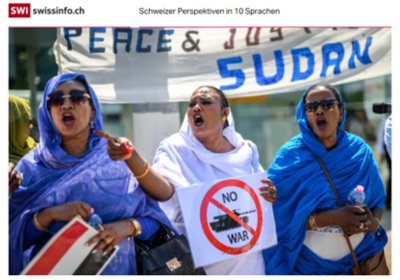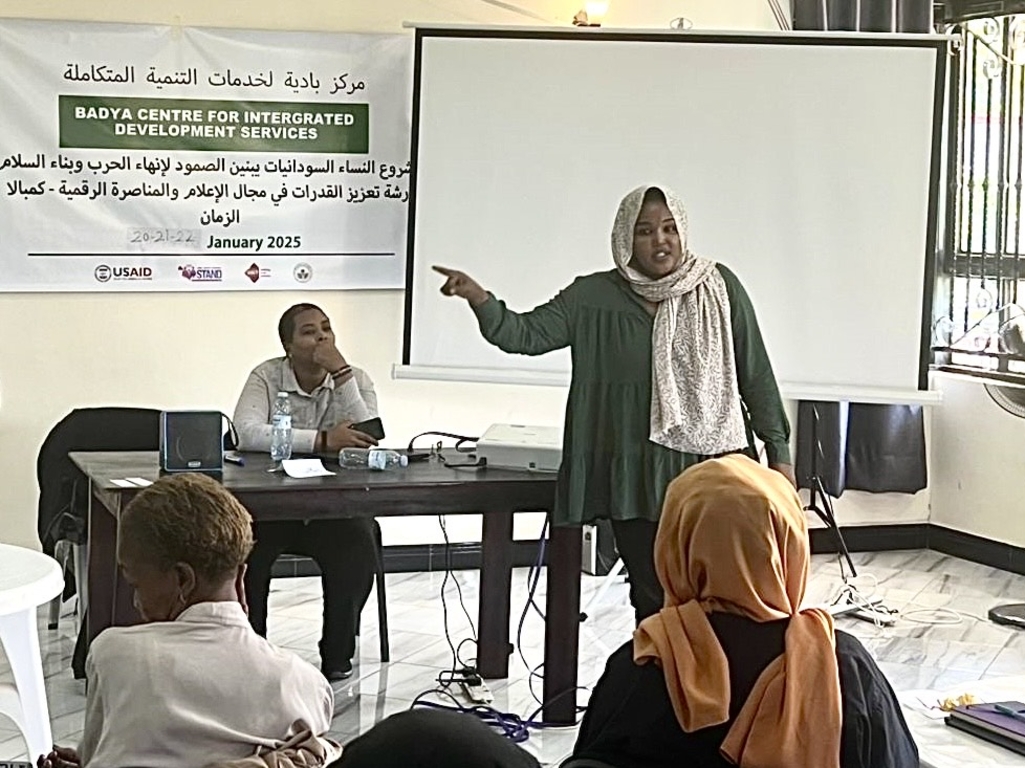Article: War in Sudan: how women want to influence the peace process
Article on swissinfo on the negotiations for a ceasefire in Sudan, with input from Rabab Baldo, a member of our network, and our director Deborah Schibler.


As part of a pilot programme in Sudan, we are connecting peace activists in the Dilling region in the south of Sudan with Sudanese activists who have lived in exile since 2023 due to the ongoing violence. Together with our local partner, we promote the targeted development of skills that these women can use to participate fully and meaningfully in peace negotiations and drive social change.
Since 2023, an armed conflict between the Sudanese Armed Forces (SAF) and the paramilitary Rapid Support Forces (RSF) has held Sudan in a stranglehold. This armed conflict was triggered by the collapse of the fragile power structure following the fall of dictator Omar al-Bashir in 2019 and the struggle for political and economic dominance in Sudan. After the fall, Sudan's Constitutional Declaration established, among other things, a model of power sharing between representatives of the military and the civilian population. When the military refused to relinquish power in 2021, the country was placed under de facto military rule.
A framework agreement brokered by the African Union (AU) in 2022 primarily provided for the integration of the RSF into the SAF. Disagreement over these provisions escalated into a power struggle among the generals and led to the outbreak of the current armed conflict.
According to the United Nations, the conflict has triggered the world's largest humanitarian crisis. Tens of thousands have been killed, almost half of Sudan's population is suffering from hunger, and around 14 million people have been forced to flee the violence. The consequences are catastrophic, especially for women and girls. The UN Independent International Fact-Finding Mission for the Sudan reported widespread sexual violence against women.
Ceasefire agreements between the Sudanese parties to the conflict have been repeatedly violated by both sides. Efforts by several states and multilateral organisations, including the UN and the AU, have so far had only very limited success. In January 2024, the AU convened the High-Level Panel on Sudan to promote peace efforts in the country. This regionally focused initiative takes a comprehensive approach to addressing the root causes of the war in Sudan.
Sudanese women look back on a long and turbulent history of struggle against military rule. They played a decisive role in the 2018 and 2019 revolution against dictator Omar al-Bashir. Despite this, women were marginalised in the political processes following his overthrow due to prevailing conservative and patriarchal norms and values.
The African Union's High-Level Panel on Sudan was convened in 2024 with the aim of ending the fighting and initiating a process for lasting and inclusive peace, democracy and justice in the country. This regionally focused initiative takes a comprehensive approach to addressing the root causes of the war in Sudan.
The AU actively promotes the participation of women and seeks to involve various civil society actors, including women's organisations. As part of these efforts, the Sudanese Women's Peace Dialogue took place in 2024. Organised by the AU, this dialogue aims to amplify the voices and experiences of Sudanese women in the pursuit of lasting peace and security in Sudan.
In 2024, 26 Sudanese women's networks and organisations launched the “Sudanese Women's Shuttle Diplomacy Initiative”. Activists were sent to countries that have the greatest influence on the parties to the conflict. Their goal is for these countries to work towards peace and stability in Sudan. The activists are demanding that the Sudanese women’s peace visions and needs are included in a peace agreement.
In Sudan, our programme focuses on networking peace activists in the south of the country and developing targeted skills to ensure their meaningful participation in peace negotiations. Our involvement in Sudan began in 2024 with two Feminist Peace Initiatives. We supported a capacity-building initiative of the NGO Badya Centre with the aim of securing long-term peace in the Dilling region of South Kordofan. We also supported the participation of activists from the “Sudanese Women's Shuttle Diplomacy Initiative” in the High-Level African Women, Peace, and Security Forum in Addis Ababa, Ethiopia.
Building on the experiences in Dilling, we have developed a pilot programme in close cooperation with the Badya Centre. Until 2026, Sudanese women peace activists will be able to use this programme to prepare for future participation in peace negotiations and the associated decision-making processes so that they can effectively contribute their perspectives, visions and demands in the peace negotiations.
The aim is to network peace activists in the Dilling region with Sudanese peace activists living in exile so that they can jointly bring women’s demands and experiences into peace processes. To coordinate their activities and influence the peace process in Sudan, the activists in exile – members of numerous civil society initiatives and organisations – have organised themselves through the Sudanese Women Coordination Mechanism in Kampala. Together with the Badya Centre, we are supporting the establishment of two working groups consisting of peace activists in Dilling and Kampala, thereby creating an environment in which knowledge can be exchanged and joint strategies for future negotiations developed.
Regardless of when official negotiations begin, the programme helps to strengthen key skills among women – for example, in the areas of mediation, negotiation and documentation of local peace initiatives. The women's initiatives in Dilling are also specifically aimed at local decision-makers to bring about societal change.